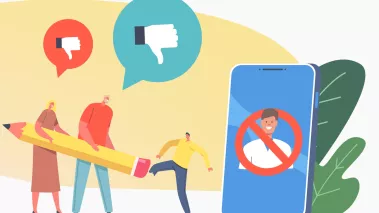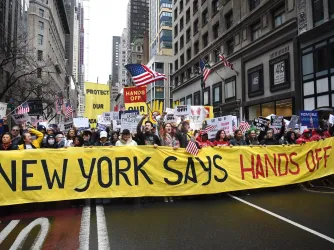Table of Contents
Illiberal and ill-advised calls to censor social media intensify

Elon Musk’s purchase of Twitter has supercharged government bullying of social media companies and calls to regulate speech on the platforms, demonstrating that many public officials are willing to subordinate the First Amendment to other interests.
Just last week, California Reps. Adam Schiff and Mark Takano delivered a letter to Musk, castigating him for his content moderation policies. “Multiple reports,” the congressmen wrote, “have shown that since you became CEO in late October, hate speech has dramatically increased on Twitter.” The congressmen then requested that Musk answer questions on how he would strengthen Twitter’s content moderation policies “to increase safety for its users.”
Schiff and Takano aren’t alone in pressuring Twitter and other social media platforms to take action against constitutionally protected speech perceived as spreading hate or misinformation.
White House Press Secretary Karine Jean-Pierre said at a press briefing that the White House is “watching” Twitter and its content moderation decisions. “Look,” she told reporters, “we have always been very clear that when it comes to social media platforms it is their responsibility to make sure that when it comes to misinformation, when it comes to the hate that we’re seeing, that they take action, that they continue to take action.”
And the calls for regulation have been bipartisan, making for strange bedfellows. In early December, Sen. Lindsey Graham said he would join forces with Sen. Elizabeth Warren to introduce legislation creating a new federal agency, the Digital Regulatory Commission, because social media “is out of control” and needs “to be regulated in some fashion.”
Not to be outdone, New York Mayor Eric Adams also got into the mix, calling on federal lawmakers to “take a higher role in how we look at social media” and arguing that the “social media industry must take a stronger role on dealing with hate.” Adams doesn’t have to appeal to his own state legislature, because it already passed an unconstitutional law — which FIRE is challenging in court — that requires social media platforms to address “hateful” speech. Meanwhile, New York’s attorney general is pushing for even more unconstitutional regulation of online speech.
What these government officials seem to forget is their utter lack of authority to demand that private platforms censor constitutionally protected speech.
As we continue to grapple with the impact of social media, we must resist any attempt to weaken First Amendment speech protections pertaining to this new and powerful technology.
For all the talk of misinformation and hate speech, both are constitutionally protected except in rare instances when the speech constitutes a true threat, intentionally incites imminent unlawful action, or meets another narrow First Amendment exception. That’s for good reason. Both “misinformation” and “hate speech” are fuzzy, easily politicized concepts.
Is hate speech protected by the First Amendment? In most instances, the answer is yes. One person’s hate speech is another’s impassioned political advocacy. Proponents of regulating misinformation underestimate the difficulty of sorting out truth from falsity and fact from opinion, or the dangers of having the government be the arbiter of truth — especially in a political environment where rhetorical hyperbole, half-truths, and disputed claims constantly emerge from all corners. Moreover, such calls fail to appreciate how the factual consensus on an issue can change, sometimes rapidly.
The government can far too easily abuse these elastic categories simply to suppress unpopular and dissenting views, or speech that challenges official narratives. A free society allows all manner of speech not only because doing so protects freedom of thought and conscience, but also because it protects against an overzealous government determining what its citizens can see, say, and even think.

Is hate speech protected by the First Amendment?
Is hate speech protected by the First Amendment? The First Amendment makes no general exception for offensive, repugnant, or hateful expression.
Government officials and elected members of Congress should know this. Instead they engage again and again in “jawboning” — which Cato Institute’s Will Duffield describes as the use of “informal pressure — bullying, threatening, and cajoling — to sway the decisions of private platforms and limit the publication of disfavored speech.” Even “requests” can feel like demands when they come from government officials who may be all too willing to use their powers of office to punish noncompliant platforms.
Forcing social media platforms to take down protected speech violates the First Amendment rights of both the user who posted the speech and the platform that hosted it. Much like newspapers, social media platforms like Twitter have a First Amendment right to editorial discretion. That means they are free to determine what speech they will and won’t allow or amplify on their sites. Back in 2021, Twitter had the First Amendment right to suspend the account of former president Donald Trump — even if many would argue that decision was unwise.
In the end, how social media companies moderate content should itself be resolved in the marketplace of ideas, not decided by government. Users and civil society groups can use their voices to criticize or push for particular content moderation practices, or vote with their eyeballs and stop using a platform if they disagree with its approach to content moderation. Ideally, the central idea that triumphs and becomes enshrined in platforms’ policies should be that more speech is preferable to censorship.
As we continue to grapple with the impact of social media, we must resist any attempt to weaken First Amendment speech protections pertaining to this new and powerful technology. We must work to persuade social media companies to respect and encourage a culture of free expression online — not have government dictate what speech is in or out of bounds.
Recent Articles
Get the latest free speech news and analysis from FIRE.

He refused to censor his syllabus — so Texas Tech cancelled his class

Fandom’s lighthouse in a sea of censorship

FIRE statement on Stephen Colbert’s James Talarico interview and continued FCC pressure


